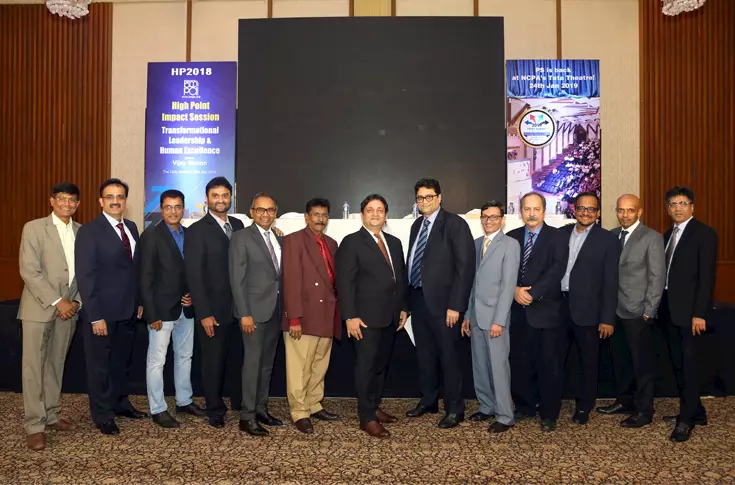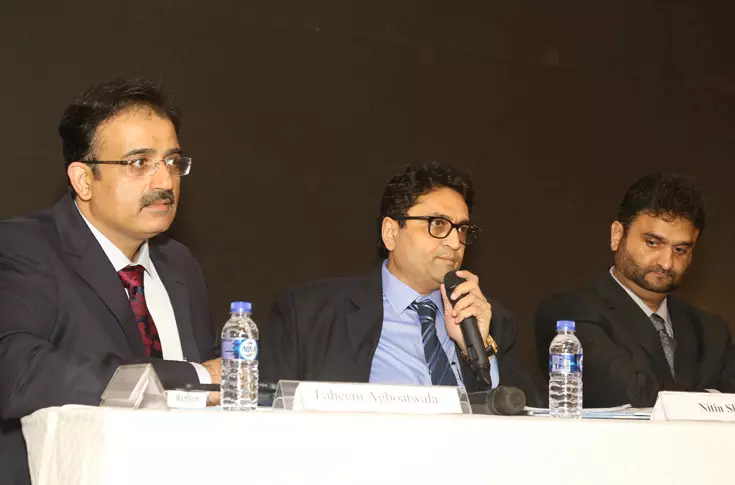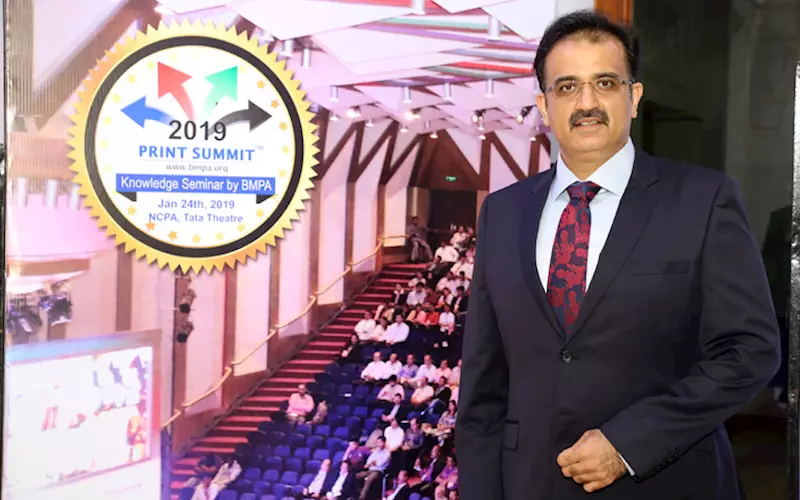PS 19 is back at the NCPA on 24 January - The Noel D'Cunha Sunday Column
The Print Summit chairman Fred Poonawala says, “We are back. Bigger and better than before. We have been planning this for the last eight months, and I am looking forward to a full house.” The BMPA president Nitin Shah says, “900 print professionals will make that annual pilgrimage to witness the PS magic.” And finally, Faheem Agboatwala says “In the last ten years I have been associated with PS, this is the most comprehensive and powerful speaker line-up we have ever had.” Agboatwala provides a preview to the one day conference and discusses all things print
08 Dec 2018 | By Noel D'Cunha
Noel D’cunha (ND): You say PS 19 is the best PS. Why so?
Faheem Agboatwala (FA): Look at the speaker line up. It’s by far the most holistic one we have come up with, at least since I have been involved with.
ND: What is the one stand-out session for you on 24 January?
FA: According to me, the “good to great” panel discussion is going to be the highlight.
ND: If you could tell us one thing about the panel discussion, what would it be?
FA: We have three very successful business leaders who have grown from hundreds of crores to thousands of crores of turnover - within their tenure (at the helm). To top it all, we have Sunanda Jayaseelan, anchor at Times Network who is going to take us through their momentous journey which made them go “good to great”. Our idea is to enthuse the printers in the audience that the time to grow exponentially has come.
ND: What is the trickiest part of hosting PS 19?
FA: Keeping the audience glued to their seats. It’s music to our ears when we hear a participant complaining that he couldn’t even take a loo break.
ND: What is the quality you seek when you identify speakers for PS 19?
FA: We whet speakers as much as six months in advance. However popular or senior they might be, we do meet them and go into depth. Accent and oratory skills take prominence over content.
ND: Which PS made you the happiest?
FA: Every PS has had its wow moments but deep down I feel this one is going to make me smile.
ND: Describe the role of BMPA in the planning of PS?
FA: Nine months of meticulous planning. Someone should record the madness in our preparatory meetings. From the sound to the music to the time taken for lunch - everything is checked and rechecked. From today to D-Day our team will be meeting every week.
ND: Your partners at PS 19.
FA: There are many partners, friends and allies. But there are three who stand out during PS 19. These are: ITC, Canon and KBA.
ND: One memorable talk at PS?
FA: The one by Sonam Wangchuk. It was straight from the heart!
ND: One thing about the Tata NCPA Theatre which a non-Mumbai person doesn’t know.
FA: This stage is a hallowed ground. From Pandit Bhimsen Joshi to Ustaad Bismillah Khan. It’s a privilege to stand on that stage and deliver performance or speech at the NCPA.
Print Summit 2019 - At a glance

PS has been hosted since 2005 by BMPA as an annual celebration on occasion of Printers’ Day. Over the years, the organisers have steered PS away from being print-centric to a more holistic event with an eclectic choice of entertainment too.
Content for PS19 is in place. Here’s the low down.
BK Shivani, a teacher from the Brahma Kumaris World Spiritual University, will talk about the journey of awareness and realisation
Don Newberry, ICP Industrial will explore Glossier Margins (innovation in packaging through coatings)
Inder Kumar Arora, Chanakya Mudrak, The Chanakya of Print motivates printers to do business on merits of their terms
Vivek Krishnani, managing director, Sony Pictures Entertainment India will deliver the PS Keynote by talking on Average is Normal
Mehul Shah, founder of Goa-based Encube Ethicals, will focus on Leaning Towards Lean
Panel Session GOOD 2 GREAT
- Sunanada Jayseelan, editor and senior producer, Times Network,
- Arokiaswamy Velumani, managing director, Thyrocare Technologies Ltd
- Ankit Chona, managing director, HRPL - Havmor Restaurants & Huber & Holly
- Pawan Poddar, director, Ashirvad Pipes
- Animesh Kejriwal, founder and Pawan Bindal, co-founders, TimePay will discuss how Regular Receivables Make Better Bottomlines
- Henrik Mueller-Hansen, Gelato will talk about a Disrupted Future in the print industry
On the sidelines of PS 19 with Faheem Agboatwala

The perception of print is formed by what people see every day, and that’s newspapers and magazines. But as you know, that’s just a tiny part of the sector. So, people have a view of what print is, and actually, it’s not, it’s a tiny sector of the total sector. And yes, they’re having a hard time – meanwhile, there’s all this growth going on elsewhere in the sector. Your view, Faheem?
FA: True. And the BMPA is going to announce something really exciting very soon - it’s called “make print great again”. Give us some time, we will be in a better position to answer this question. The problem is real, and we need a long-term solution.
FA: Commercial printers as a norm are more job workers than creators. As a rule, they would print what the designer or the client asked them to. Some have taken the plunge into creating products. I believe that is where the margins are, and this is where we should be moving to.
One big concern with the commercial print sector is: falling demand. This has resulted in what we call the head in the sand, ostrich mentality that something will turn up. Since you have chaired innumerable STB sessions, what is your view on the future of commercial print?
FA: Whatever can go E will go E is what I have said before. This is a reality. While the threat is real, this is a time for us to come up with innovative ideas. Let’s change ourselves to adjust to the changing environment. Let’s not wait for the environment to change us.
Digital print is different, because the model and pricing are different, and there is the opportunity to provide more variety and probably create value for print. The question is: are we (in India) doing it?
FA: Till such time that personalisation doesn’t get popular in India, digital won’t have an explosion. Once we taste the successes of personalisation, the market will look very different.
PS talks about disruptors in the e-commerce space. But there are also disruptors in the commercial space, wide-format, etc. The question is: has the business model changed and to what extent?
FA: To me even a print management company is a disruptor. We have to understand that every decade or so brings a big shift and we have to adapt to it. Let’s hear what Henrik Mueller-Hanse, CEO of Gelato has to say at PS19.
Some people say consolidation, others say business failure. What is really happening? And why has consolidation become such a bogie word in our industry?
FA: Consolidation is happening across industries. Print and packaging are not going to be exceptions. Selling out is a super exit strategy and buying to enhance one’s portfolio is again a smart business decision. We have seen this happening in the label space, and I foresee several such deals in the commercial space too. Printers must get their books in order.
Why so?
FA: Transparency is the first step to consolidation.
Many people ask us what is happening to print. We say, the cities where print is huffing and puffing have an astonishing percentage of business owners in our sector who are approaching retirement age. Where they aren’t on the cusp of retirement, the sector is thriving? You agree or no?
FA: Completely agree. Succession planning is a much-ignored subject within our industry.
What about automation? Paul Bradley’s session at PS and even two STB sessions spoke about staffing costs.
FA: Relatively cheap labour, expensive real estate and lack of skilled operators make Indian print companies shy away from advanced automation. The trend is slowly changing; I believe people will change due to the convenience offered by automation.
So, is automation an area that manufacturers can help in? Are they doing enough in India?
FA: AI is soon going to change what we know as automation, what we think is impossible will become possible with machine learning. Exponential changes are in the offing, and we must be prepared for the big shift.
Everyone says we listen to the clients when they say, ‘I’ve got this problem, how can you help me with value addition, etc.’ Question is: is investment driven/dictated by clients?
FA: Yes, in my opinion, most investments (at least in packaging) are driven by customer need.
Having a good business, making money and growing at a reasonable 5%-10% rate is no bad thing. But what should a print firm REALLY be doing?
FA: Moving from being “just” a printer to a marketing solution provider. Selling solutions rather than print is the future.











 See All
See All